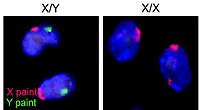
Photo from wikipedia
Abstract In vitro gametogenesis (IVG) might offer numerous research and clinical benefits. Some potential clinical applications of IVG, such as allowing opposite‐sex couples experiencing infertility to have genetically related children,… Click to show full abstract
Abstract In vitro gametogenesis (IVG) might offer numerous research and clinical benefits. Some potential clinical applications of IVG, such as allowing opposite‐sex couples experiencing infertility to have genetically related children, have attracted support. Others, such as enabling same‐sex reproduction and solo reproduction, have attracted significantly more criticism. In this paper, we examine how different ethical principles might help us to draw lines and distinguish between ethically desirable and undesirable uses of IVG. We discuss the alleged distinction between therapeutic and non‐therapeutic uses of assisted reproduction in the context of IVG, and show how it is both problematic to apply in practice and theoretically dubious. We then discuss how the ethical principles of reproductive justice and beneficence apply to IVG for opposite‐sex reproduction, same‐sex reproduction, and solo reproduction. We suggest that these principles generate strong reasons for the use of IVG for opposite‐sex and same‐sex reproduction, but not for solo reproduction.
Journal Title: Bioethics
Year Published: 2019
Link to full text (if available)
Share on Social Media: Sign Up to like & get
recommendations!